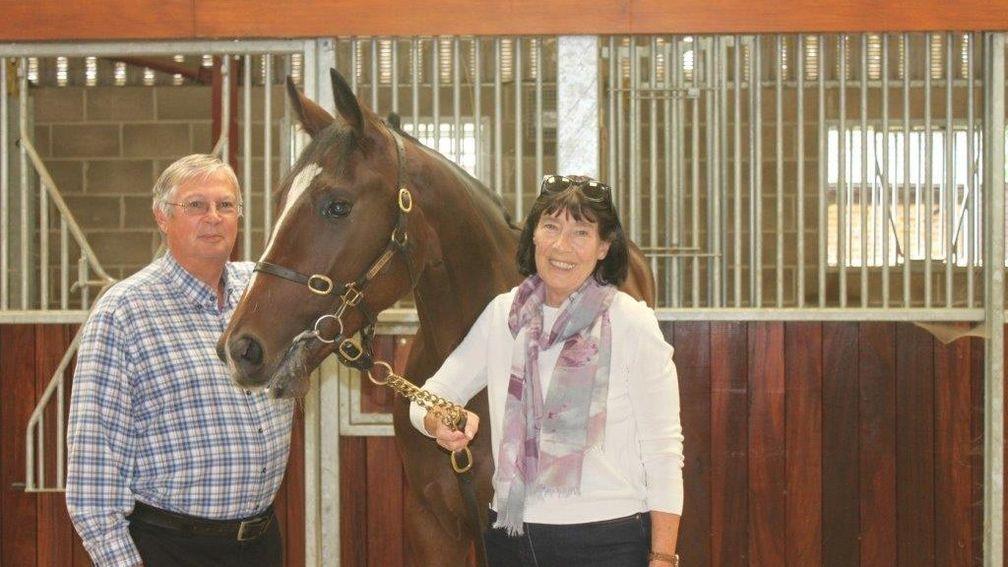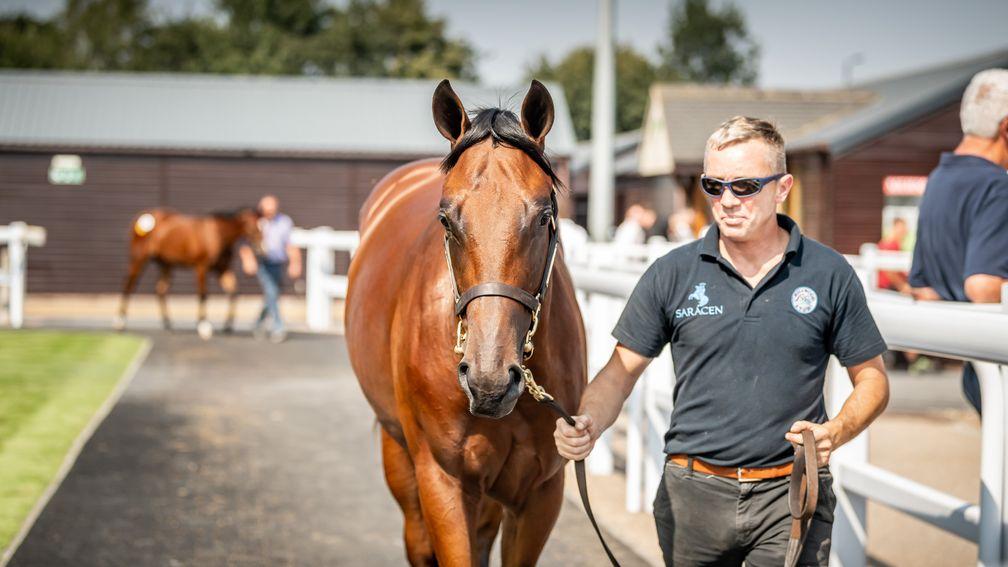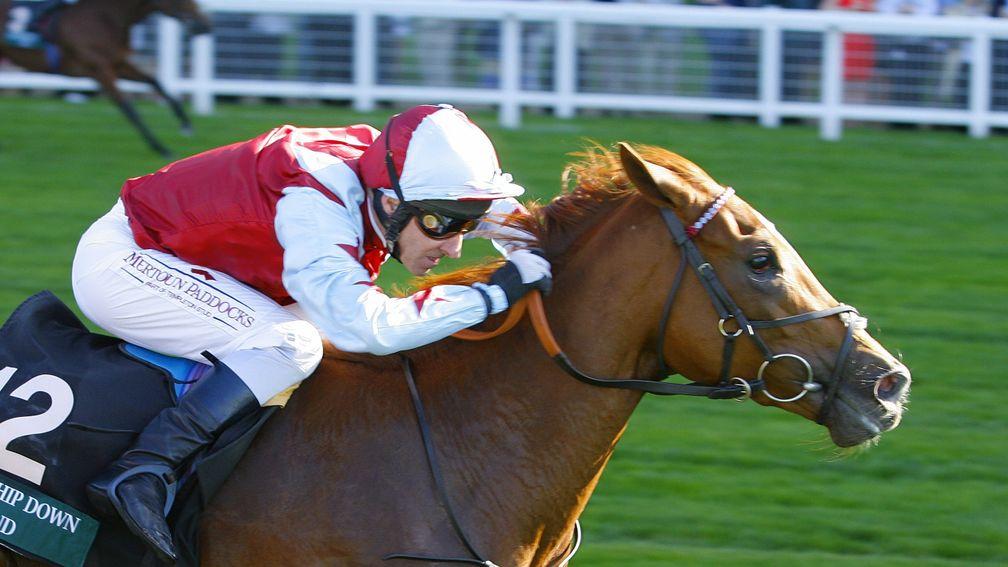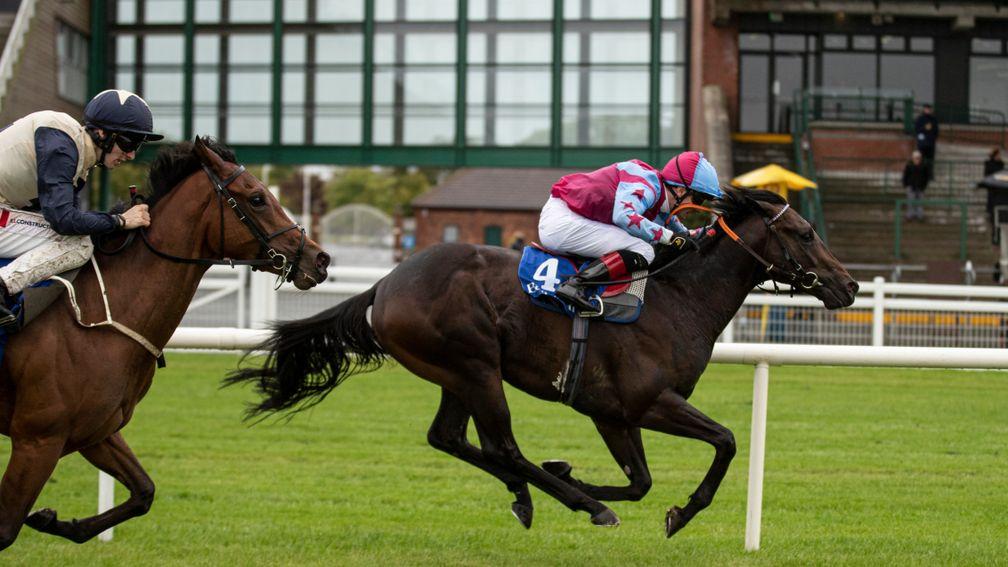Bob and Pauline Scott riding crest of a wave with record yearling and Sir Boris
Martin Stevens speaks to the couple enjoying a purple patch with their homebreds

Smaller-scale breeding is full of highs and lows and sadly, for many, the bad times outnumber the good. Horses can suffer illness or injury requiring expensive veterinary attention, prices of feed, bedding and other essential services are always going up, and then young stock often sell for less than production costs.
It's a good job, then, that those moments of success – when the agonised-over mating proves correct and the sleepless nights on foaling watch are rewarded, either with a big profit in the ring or a black-type win on the track – are so satisfying and stirring that the exercise seems worth all the time and money expended on it.
Former Coral chief executive Bob Scott and wife Pauline, who own Parks Farm Stud in Essex, are riding just such a crest of a wave in recent weeks. They bred the Kingman colt out of Shamandar who broke the Goffs UK Premier Yearling Sale record when sold to Coolmore for £440,000 in August and the Listed-winning two-year-old Sir Boris, who carried home colours when third to Shadn in the Group 2 Criterium de Maisons-Laffitte on Saturday.
Almost inevitably, Pauline Scott has tales of the trials that lie behind the breeding of those horses in the spotlight, especially in the case of the Kingman colt's dam.
“The story of Shamandar has indeed been eventful,” she says of the 12-year-old daughter of Exceed And Excel, with some understatement. “We bought her in 2008 from the Tattersalls February Sale as a companion for a homebred filly foal. She was about ten months old and the plan was to sell her as a yearling. She cost 12,000gns; the dam had not produced anything much but she was a nice enough foal.
“It wasn't long after taking her home that she decided to jump the paddock fence into my garden and didn't quite make it. She took all the flesh off one front leg but thankfully missed the tendon.

“After a period of box rest she was turned out again with the other filly and thought it great sport to gallop around the field, and she managed to chip both front pedal bones on some unusually hard ground which meant another long spell of box rest. She was withdrawn from the Doncaster yearling sale and there was little chance of getting her ready in time for the October sales in Newmarket, so in the end she went to Tattersalls in December.”
More drama ensued at Park Paddocks.
“She was the last lot on one of the coldest nights I can recall,” says Scott. “It snowed all day and I seem to remember a thermometer up at the sales reading -9 degrees. We were being asked to show her in a blizzard!
“By the time we got to the ring there was no one there and we bought her back at 3,500gns. I recall walking her from the top stables back to the box park, it was treacherous underfoot and it was a struggle. She wasn't the easiest, especially as people were arriving with foals and she wasn't happy to see them. I spoke to William Haggas and he suggested that I send her to Malcolm Bastard with a view to getting her to the breeze-up sales.”
However, in the course of prepping Shamandar, Bastard saw something in the filly and suggested the Scotts might like to keep her and send her to Haggas.
Bastard's opinion proved correct and the filly bought for chickenfeed went on to earn more than £200,000 on the track by finishing second in the Weatherbys Super Sprint and winning the Dick Poole Fillies' Stakes and the valuable Watership Down Stud Sales Race.
Sadly, Shamandar injured herself again and did not race at three, and reappeared at four but showed little as it seemed her past scrapes had caught up with her. So she was sent to the paddocks and had Pour Moi appointed for her first mating, with a bonny filly foal who would turn out to be Poppy Time the result.
And then, in one of those twists that can make breeding feel more an ordeal than an enjoyable venture, Shamandar succumbed to illness again.
“Within a few days of giving birth she got colic,” says Scott. “She had two surgeries, got peritonitis and spent five weeks in intensive care at the Newmarket Equine Hospital followed by a long, very worrying and difficult recovery period.
“She already had uveitus [an inflammation of the eye] and not long after her return she had one eye removed. But, the story does not end there: as a yearling, Poppy managed to slip over in her stable and broke her pelvis – badly.
"It was touch and go for a long time but she survived and we did put her in training with James Eustace but obviously an injury as serious as hers had to impact on her performance.
“I've spent so much time at NEH over the years that [senior surgeon] Ian Wright once suggested that we were after an invite to their Christmas party!”

Shamandar's health issues have of course racked up huge expenses. But, despite it all, she is “probably the toughest horse I'll ever own and is very dear to me," says Scott.
That little bit more dear, no doubt, since her Kingman colt helped settle some of those vets' invoices.
Sir Boris's story is, mercifully, a little more straightforward. The Due Diligence colt, trained by Tom Dascombe, is the first foal out of the winning King's Best mare Queens Park, who was bought by James Delahooke on the Scotts' behalf as a foal at Arqana for €21,000.
Straightforward but not seamless, as Scott explains.
“She's a stunning looking mare but being by King's Best she has been a bit tricky to deal with,” she says. “We sent her up north to John Davies to be trained and she won a couple of races at three. She sustained a career ending injury at four and was retired.
“She came back to the farm and we put her in foal to Due Diligence and the plan was to sell her carrying the foal in the December sales. We wanted a new broodmare and asked James [Delahooke] to have a look at that sale. I remember him saying that he'd had a look around and the best value was a mare by King's Best and we already owned her! We did let her go through the ring but we bought her back and how pleased are we now that we made that decision?”
Sir Boris did have provisional entries for foal and yearling sales but as he was a good-looking, well balanced individual and a first foal, the Scotts elected to put him in training to help establish his dam's profile.
Oh, and by the way, Scott is keen to stress the colt's name has nothing to do with the British Prime Minister.
“When the foals are born we choose a letter and all the foals are given a pet name starting with that letter,” she says. “That year it was B and he was duly named Boris. I couldn't decide on a name for him and he was close to his first run so I just added the 'Sir'. Anyway, he has certainly made us proud.
Sir Boris has also provided an important pedigree update to his half-sister by Australia – “a lovely chestnut filly” – selling as lot 1,639 on the first day of Book 3 of the Tattersalls October Yearling Sale, as well as to his half-brother by Ulysses who is reportedly the pick of the Parks Farm Stud foal crop this year.
The Scotts have four yearlings heading to the sales at Newmarket, starting with a Pivotal filly out of Chantry, a daughter of Galileo and their foundation mare Winds Of Time (lot 859), at Book 2. Then in Book 3, besides Sir Boris's half-sister, are a Camelot filly out of the Theatrical mare Silent Act (1,357) and an Oasis Dream filly out of Julia Dream, another daughter of Winds Of Time by Montjeu (1,544).
“The Pivotal and Oasis Dream fillies both have an update as Critical Time, who is by Pivotal out of Winds of Time, won recently and has been second twice this year from just four starts,” says Scott. “She's in training with William Haggas who says she's improving all the time, so fingers crossed we can get some black type for her.”

While Hillwood Stud presented the Kingman colt out of Shamandar at Doncaster, Parks Farm Stud will be consigning to Tattersalls itself.
“We have a very good stud groom in Jamie Went and with his wife Helen he has worked hard to produce them to a high standard,” says Scott. “It's very important to have good staff and I'm fortunate to have that here.”
Parks Farm Stud was bought upon the sale of Coral in 2002. The operation encompasses a large American barn with foaling boxes and vet's room, a school and horse walker, with another 50 acres of land added over the years.
Careful consideration is given to the economics of running the nursery, as Scott explains.
“We started with one broodmare, then three and very quickly got up to ten,” she says. “Yes, we have reduced numbers and next year we expect to cover five of our mares and maybe we'll buy another if the right one comes along at the right price.
“We're changing things around a bit – we've had to. We may decide to produce less and buy foals.
“It's important to try for quality by sires that you like rather than quantity, and I think in the past I've given some of the mares too many chances and kept going with them for too long and that has proved costly.
“It's all very well using a first-season sire and we know that it can work out well if you are lucky – Sir Boris being a case in point – but in the end we're trying to produce a racehorse and if there are proven older sires that have been there and done it and they're good value then we'll use them.
"At the end of the day if that means no one wants to buy them, then at least it's a horse that we'll want to put into training. I still don't understand why stallions go out of fashion – sometimes even before they have had a runner on the track!”
Scott is also keenly aware of the responsibilities that weigh on the shoulders of those who bring young horses into a world of harsh market realities.
“We've always been patient with the horses but at the end of the day if they're not going to make it we get them out of training,” she says. “I will not let horses go through the horses in training sales cheaply as I have no desire to see them go to an uncertain future.
“I've successfully re-homed lots of horses and many of them have had careers in eventing, showjumping or just as someone's hack. I pretty much know where most of them are and I continue to take an interest in them. If they are old or were injured they stay with me at the farm. If I've brought them into the world, I cannot stop feeling responsible for their welfare.”
Yes, the small breeder's lot is not always a happy one, so, as Scott summarises, the successful spells have to be cherished.
“We love what we do and never tire of looking at these beautiful animals but it is a difficult business to be in especially as a small farm,” she says. “The important thing is to appreciate the good bits and we have certainly celebrated our recent good fortune and will continue to do so and hopefully the forthcoming sales will give us more reason to smile.
“After Doncaster we had fish and chips accompanied by a couple of bottles of Dom Perignon! There are highs and lows in this game and we have certainly had plenty of the latter so when you have a spell like this, it's amazing.”
Published on inFeatures
Last updated
- 'This latest season has underlined his status as a breed-shaping sire' - Tony Morris's take on the 2024 European Pattern
- Broken glass and burst blood vessels at a totes emosh renewal of the December Foal Sale
- All work and no play makes James a dull boy at the Goffs November Sale
- Highs, lows and my Serbian counterpart provide a stern test of sales reporting stamina
- A glitch in the bloodstock matrix as Coolmore throw shade, Mangan messes with my dinner plans and a new master of sales ring satire emerges
- 'This latest season has underlined his status as a breed-shaping sire' - Tony Morris's take on the 2024 European Pattern
- Broken glass and burst blood vessels at a totes emosh renewal of the December Foal Sale
- All work and no play makes James a dull boy at the Goffs November Sale
- Highs, lows and my Serbian counterpart provide a stern test of sales reporting stamina
- A glitch in the bloodstock matrix as Coolmore throw shade, Mangan messes with my dinner plans and a new master of sales ring satire emerges